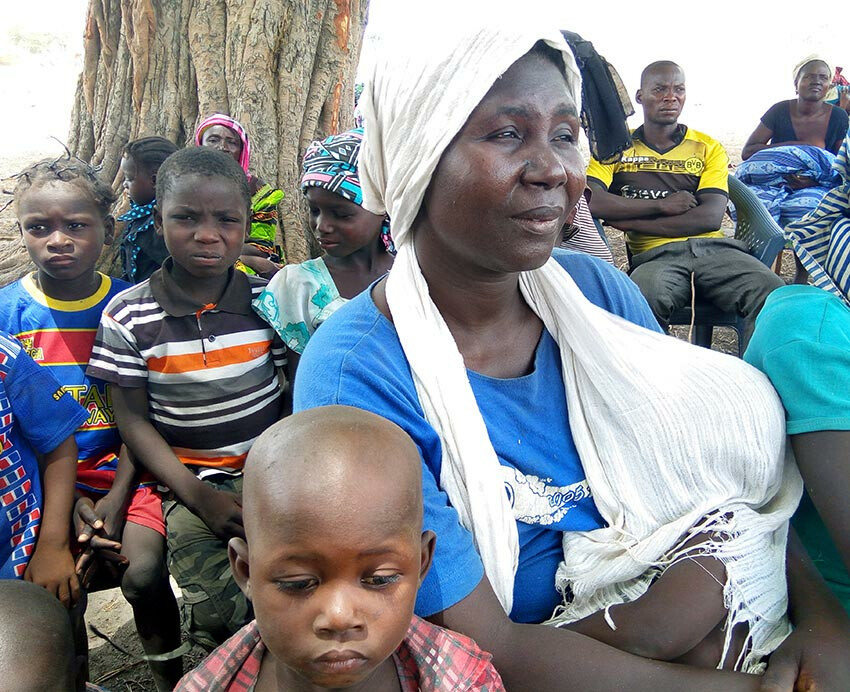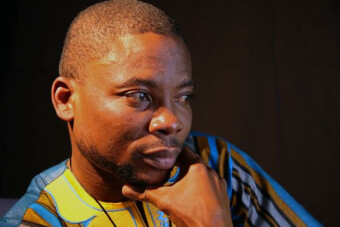Global Migration Sunday (Dec. 3) shines light on a crisis
By Julie Dwyer
UMNS

A woman holds a baby while seated among refugees at a United Methodist church in Jalingo, Nigeria. United Methodist churches in Nigeria served as refugee camps for people displaced after attacks on villages in Lau, a local government area in Taraba State, in early 2017. Photo by the Rev. Ande I. Emmanuel.
At 10 years old, Edison D. Toe was selling kerosene on the streets in Liberia to provide extra money for his family.
One night, he saw a group fleeing heavy fighting between rebel and government forces in the area. Fearful for his own life, Toe made the difficult decision to join the crowd, leaving his mother and nine siblings behind.

Edison D. Toe fled violence in Liberia at age 10 and spent much of his life in refugee camps. He’s now a Global Mission Fellow with the United Methodist Board of Global Ministries. Photo by Cynthia Mack.
“I was small, but I can still remember how I left my country and became a refugee,” he said of that night nearly 20 years ago. “I was on the streets for two years. I cried many days for food, clothes
Unfortunately, Toe’s situation is not unique. Today, more than 65 million people worldwide have been forcibly displaced from their homes due to conflict, persecution or natural disasters. Over 21 million of those are refugees, more than half of whom are under the age of 18, according to the United Nations Refugee Agency.
In response to the global migration crisis, The United Methodist Church has planned a day of prayer and a special offering to raise awareness and funds to aid migrants and refugees.
Global Migration Sunday will be held Dec. 3, the first Sunday of Advent. The offering will go to the denomination’s Global Migration Advance (#3022144), a fund set up in 2014 for donors to designate gifts specifically to support work that alleviates the suffering of migrants. To date, more than $1.4 million has been donated to the fund, assisting more than 46,000 migrants.
Thomas Kemper,
Churches can adopt a full liturgy and other worship resources prepared by the church for Global Migration Sunday — available in different languages — but simply vowing to pray the same prayer on that day will be a unifying experience, Kemper said.
“Imagine people in Manila, in Munich and in Milwaukee united in prayer around the world, thinking of migrants, immigration, refugees, but also knowing that Methodists around the world are involved in advocating for and receiving migrants. That is my hope for the day.”
San Francisco Area Bishop Minerva Carcaño said welcoming the migrant is the responsibility of people of faith. She leads the denomination’s Immigration Task Force, which advocated for Global Migration Sunday.
“The United Methodist Church has long had a strong stand for welcoming the migrant,” she said. “Jesus teaches us to welcome the migrant and tells us that when we welcome that stranger that comes into our land, God’s land, that we welcome him.”
Toe’s story is evidence of how important that welcome can be. He eventually made his way to a refugee camp in Côte d’Ivoire, where he was taken in by foster parents. While he was forced to flee again when war broke out there, he was able to make it safely to a refugee camp in Ghana with the help of his new family.
Toe has come a long way from his days on the streets. He received a scholarship from United Methodist Women that allowed him to pursue higher education. Today, he is a Global Mission Fellow with Global Ministries.
More than a decade after fleeing his home, Toe was reunited with his mother and siblings in Liberia. He plans to return to his home country to work with a nonprofit he started to assist children, at-risk youth and teenage mothers.
Unfortunately, not all refugees find the welcome that Toe did. Many are still waiting for hope in refugee camps or looking for
“(Global Migration Sunday) is an effort to remember our faith, to remember the call to love our neighbor and to love the migrant and to pray for them and to do all that we can in order to support them in their hour of need,” Carcaño said.
The United Methodist Church is committed to working ecumenically on the issue, Kemper said. At least 10 percent of resources raised on Global Migration Sunday will support the refugee resettlement work of partner organization Church World Service.
The Global Migration Sunday offering also will provide advocacy and education materials and grants to help conferences and congregations become better equipped to minister to migrants locally and globally.
“Gifts through the church represent life and hope to those hurting from the experience of displacement and homelessness; they provide not only food, shelter and health services but also a sense of caring about their welfare and future,” Kemper said.
Carcaño said it’s important for United Methodists to continue to raise awareness about the global migration crisis because it affects the future of the church. When The United Methodist Church turns its back on migrants, she said, it loses the opportunity to grow as a church, spiritually and numerically, as many migrants seek out communities of faith.
“Somehow, we are all related to this human family (of migrants), and
Julie Dwyer is an editor and writer for United Methodist Communications. Contact her at (615) 742-5470 or .
